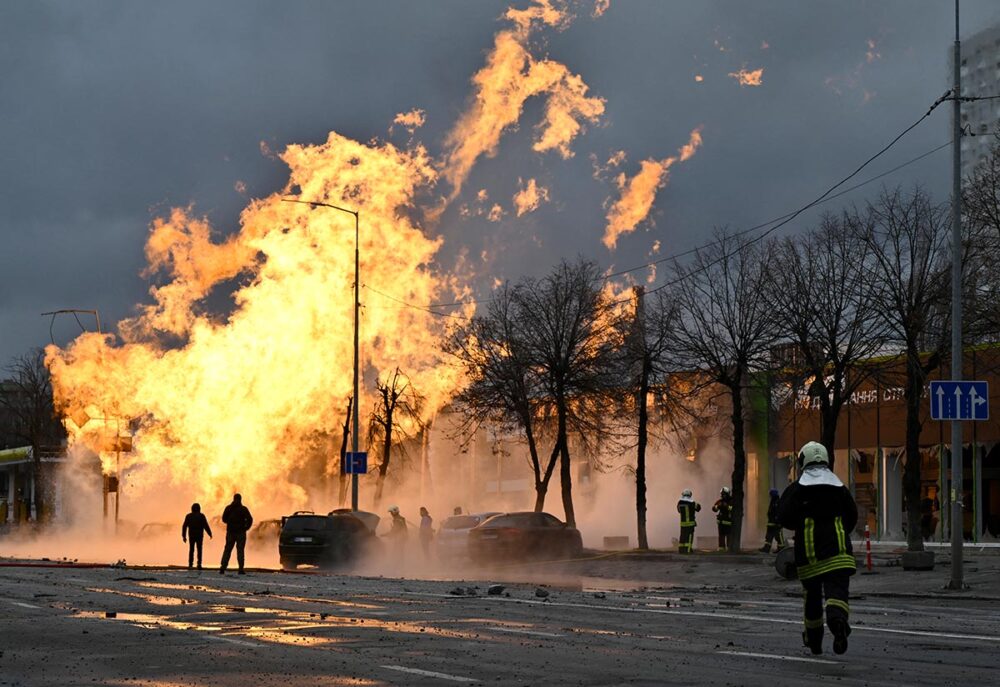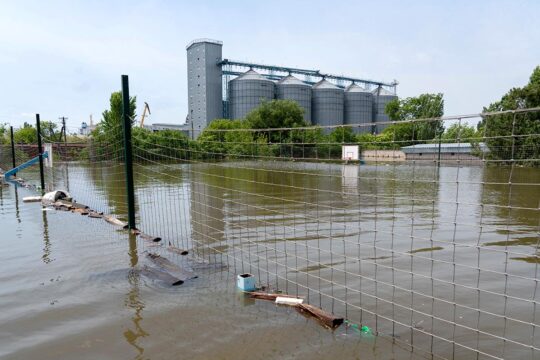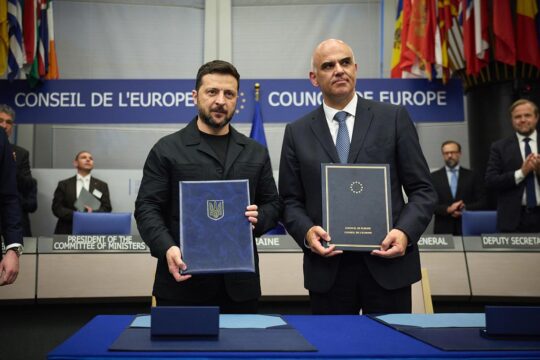On June 25 the International Criminal Court (ICC) has issued arrest warrants for Sergei Shoigu, the former Russian defence minister, and leading Russian general Valery Gerasimov, for war crimes and crimes against humanity for directing attacks against civilians and civilian objects in Ukraine. This move follows two earlier arrest warrant applications for other senior Russian commanders for the same allegations, more specifically attacks against the power grid. “It's part of the larger puzzle that this [ICC] prosecutor isn't focusing on ‘low-hanging fruit’,” says Janina Dill, professor of global security at Oxford university. “He's going after conduct of hostilities and he's going after the top of the chain of command.”
Judges found there were "reasonable grounds to believe that the two suspects bear responsibility for missile strikes carried out by the Russian armed forces against the Ukrainian electric infrastructure" between October 10, 2022, and at least March 9, 2023.” Russia has repeatedly said Ukraine's energy infrastructure is a legitimate military target and denies targeting civilians or civilian infrastructure. But according to ICC judges, there were reasonable grounds to believe the strikes targeted mostly civilian objects.
Lidiia Volkova, a lead legal adviser at Global Rights Compliance (GRC), an NGO working in Ukraine alongside the office of the prosecutor general, says “most of the attacks took place in cold season, when the civilian population generally is more dependent on electricity supply.” According to her, “some cases reviewed by GRC specialists contained information according to which energy supply at least in certain power plants was used only by civilians.”
Civilian vs military objects
“If they can show that these electrical facilities were civilian objects, that they weren't being used for military purposes at all, then it should be relatively straightforward” that it would violate the principle in international humanitarian law of “distinction”, says Adil Haque, professor of international law at Rutgers University. Haque notes that ICC prosecutor Karim Khan is “seeking warrants both for directing attacks against civilian objects, which is a violation of distinction, and, barring that, disproportionate attacks.” This means Khan intends to show that “these were not dual use [military and civilian] objects, that these electrical facilities were not contributing in an effective and significant way to Ukraine's war effort and damaging or destroying them would not have yielded definite military advantage.” But if necessary “the prosecutor has an argument in the alternative, which is that even if some of these facilities were military objectives, the foreseeable harm to civilians would have rendered the attacks excessive.”
ICC judges have indeed considered that "for those installations that may have qualified as military objectives at the relevant time, the expected incidental civilian harm and damage would have been clearly excessive to the anticipated military advantage", making the attacks war crimes. Volkova points out that “in different regions of Ukraine civilians were left without electricity from several hours to days, which also affected water and heating supplies, public transportation, as well as the work of health services.”
What proves proportionality?
This is where it gets tough, explains Dill. For these dual targets, Khan needs to establish that these attacks criminally violated the principle of proportionality. “He would then have to engage in a quite difficult task of saying: what is the reasonably anticipated military advantage from this strike? And what is the reasonably anticipated civilian harm? For civilian harm, particularly when it comes to power plants, it raises another very interesting question, because it may not be that these civilian casualties from the strike itself are ‘clearly excessive’. But that in order to come to a judgement of a clearly excessive, anticipated civilian harm, you have to take into account a sort of second order effect of the strike,” Dill says. For instance, for a power plant in the middle of winter, such effect would be “that vulnerable civilians will die because they can't heat their rooms, because hospitals are out of power, etc.”
One relevant element Volkova says the judges may consider is that “the Russian Federation was targeting power generation as well as its distribution networks all over the territory of Ukraine and, usually, very far from the frontlines.” Therefore, she says, “it can be deduced that the main goals of the attacks were to cause damage to civilian infrastructure, energy distribution, and diminish public morale.”
No successful legal precedent
The UN International Criminal Tribunal for the former Yugoslavia (ICTY) set up in the 1990’s also had some cases on conduct of hostilities. But none alleging excessive civilian harm held up on appeal. Never before has an international court actually laid out precisely what is a proportional amount of incidental civilian harm. “We have actually no judgement on proportionality that has withstood appeal,” Dill reckons, because of the difficulty of determining “that civilian harm is clearly excessive to the military advantage.”
In short, proportionality is “hard to prove,” says Eitan Diamond, manager and senior legal expert at the International Humanitarian Law Centre, in Jerusalem. “In order to be able to assert that somebody committed those crimes, you have to know what they knew about the target they wanted to attack,” he explains.
Dill agrees that “there's this idea that certain [war] crimes are harder to prosecute than others”. For example she says for some actions during a war, “there isn't any context in which that conduct is ever legal: like sexual violence, hostage-taking, abusing a prisoner. So these seem to be easier to prosecute than, for instance, conduct of hostilities crimes where the conduct itself is usually an attack and an attack itself isn't illegal. Proportionality particularly falls in that category.” In order to establish “an illegality, never mind criminality, you need a lot of contextual information.”
“Clearly” disproportionate
“There is a fair bit of consensus on what an illegal, disproportionate attack looks like, but that extra question of what is it that actually makes it criminally disproportionate, we just really don't know,” says Dill.
The ICC itself is governed by the Rome Statute which also added the word ‘clearly’ when describing what constitutes a criminally disproportionate attack. “And so there's even a question whether we should understand that as meaning there's a higher bar under the Rome Statute to qualify a disproportionate attack compared to customary international law or the ICTY,” Dills continues. “The fact that the prosecutor is going for these conduct of hostility crimes first means that he is not shying away from prosecuting that which is supposedly hard to prosecute. But in some sense, there's a lot of room for him to develop the doctrine and our understanding of what it actually looks like to wage war in a manner that is illegal and criminal, particularly what an attack where the anticipated collateral damage is clearly excessive in relation to the military advantage looks like.”
Implications on the Israel/Palestine situation
So far in the Israel/Palestine investigation, also at the ICC, the prosecutor has focused on other crimes: hostage-taking by Hamas and starvation by the Israeli side. But the Ukraine arrest warrants could also serve as templates for further charges against senior Hamas or Israeli officials. Haque cautions of some obstacles though. “Again, it's not enough to see the consequences on the ground. You need to be able to attribute conduct to a particular party in the armed conflict, and then up the chain of command to a defendant who is worth going after. So even if a rocket falls within Israel, the prosecutor still needs to know if it was fired by Hamas or Islamic Jihad or some other group and then work up the chain of command.”
Diamond speculates that there could “also be more evidence coming from soldiers to speak out about what they did”. He believes that it “won't be possible to build a comprehensive case in relation to the vast majority of the attacks” but that “there will be some significant evidence” that the decision to attack certain civilian objects had clear ramifications for civilians that should have been foreseen, and that it suggested “that there was a disregard for these basic principles that are supposed to regulate the conduct of hostilities.” He is specifically mentioning reports on the artificial intelligence supplied targeting systems, which have been denied by the Israeli authorities. ”If they are true, that the system was designed in such a way that it would identify as a target an individual in circumstances where it was foreseen that it would also kill tens of people around that individual, if those kinds of incidents aren’t recognised as a violation of the principle of proportionality, then I really don't understand what the principle is.”
“We may still expect more to come for Israel-Palestine,” believes Dill. “At minimum, we know that the ICC prosecutor doesn't think conduct hostility crimes are too difficult to prosecute. That is actually clear at this point.”








